Filter by...
Reset all
Publications (227)
Technical Note
pdf
This technical note describes the Uganda Revenue Authority (URA) presumptive tax returns data covering financial years from 2015/16 to 2022/23. The data contains 21 variables, including information on taxpayers’ characteristics, turnover, and payable taxes. It covers the population of small...

Rising public debt in Africa, exacerbated by multiple shocks and limited fiscal space, poses a significant challenge to the region’s development. Half of the low-income countries in sub-Saharan Africa (SSA) are in debt distress or at high risk of it, as calls for international action, such as...
Journal Article
This peer-reviewed research is available free of charge. UNU-WIDER believes that research is a global public good and supports Open Access.
COVID-19 pandemic, household welfare and diversification strategies of smallholder farmers in Uganda
Agricultural activities in many sub-Saharan African (SSA) countries are subject to various risk factors that the COVID-19 compounds. Earlier studies on the effect of COVID-19 on smallholders neglect the issue of comparison with non-farm households. The study uses micro-level household datasets to...
Report
pdf
This report documents UGAMOD, the SOUTHMOD model developed for Uganda. This work was carried out by Uganda Revenue Authority (URA) and Makerere University in collaboration with the project partners. The results presented in this report are derived using UGAMOD version 2.1, which is part of the...
Blog
Uganda, with a fiscal deficit of 5.6% in 2023, has increasingly turned to local resources to make up for its revenue shortfall since the World Bank suspended its funding on 8 August 2023 over the country’s anti-homosexuality law. In early April 2024, traders in downtown Kampala protested against...
Working Paper
pdf
– Comparing the performance of universal basic income in Uganda and Zambia during COVID-19
The debate over universal basic income (UBI) has gained traction in the developing world in recent years. We analyse the effects of four UBI schemes on poverty and inequality measures during normal times and times of crisis in Uganda and Zambia. We use static microsimulation models and nationally...
Working Paper
pdf
Cross-border traders face a choice between official and unofficial border crossings. The latter allow them to evade taxes, but expose them to other risks, such as bribes, fines, and arrest. We investigate the perceptions of cross-border traders about the risks of trading officially vs unofficially...
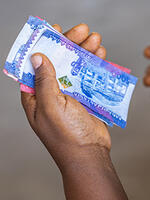
Sovereign Wealth Funds (SWFs) have become a symbol of national success and a means for global, commercial and geopolitical influence. But how well do they contribute to national development goals? Furthermore, global decarbonization threatens the future of many fossil fuel-financed SWFs. Here, we...

While multinational corporations (MNCs) make up only 1.9% of firms operating in Uganda, they are overrepresented among tax holiday beneficiaries. New estimates reveal that Uganda’s revenue losses due to these tax expenditures peaked at USD 42 million in 2020.A new dataset allows for the first...
Blog
Sub-Saharan Africa has abundant natural resources and a substantial market, with an estimated population of 1.2 billion. The population is projected to grow by nearly 80% and reach almost 2 billion people by 2043. This population growth is expected to parallel an economic expansion, with annual...

Donors increasingly speak of locally led aid response, but often do not walk the walk. Case in point is the United States Agency for International Development (USAID), the humanitarian and development agency of the largest donor country in the world. In late 2021, USAID set a target that 25% of its...
Journal Article
This peer-reviewed research is available free of charge. UNU-WIDER believes that research is a global public good and supports Open Access.
When seeking to increase their tax revenues, policy-makers face a likely tradeoff between decreasing personal income tax rates (making formalizing more attractive and potentially contributing to revenue) and alternatively raising tax rates (potentially slowing down the formalization of the economy...
Blog
As we conclude the groundbreaking years of the 2019–2023 work programme on transforming economies, states, and societies, we reflect on the milestones achieved and anticipate the journey ahead.In 2019, I assumed the role of Director at UNU-WIDER and initiated the planning of the new work programme...
Working Paper
pdf
This paper studies the impact of the COVID-19 pandemic on formal sector employment in Uganda. Utilizing employee-level administrative tax data from the Uganda Revenue Authority, we describe the dynamics of employment as the pandemic evolved, seeking to better understand the various coping strategies...
Technical Note
pdf
This Technical Note describes Ugandan trade data covering import and export declarations for ten calendar years from January 2013 to December 2022, constructed from transactional-level Ugandan administrative data. The trade data series contains transaction-level ten datasets on imports and ten on...
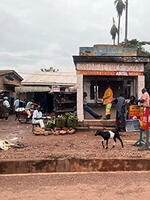
– Combining tax data and Google Street View images
The issue of tax non-compliance among businesses is pervasive in many developing economies, including Uganda. But to what extent do businesses comply with their tax obligations in the capital city, Kampala? Can the local environment and geographic information help predict the risk of tax non...

Parts of Uganda that had centralised political systems before colonial rule are more likely to have higher rates of voluntary tax compliance. Merima Ali and Odd-Helge Fjeldstad look at why that might be the case.Voluntary tax compliance is an important source for domestic revenue in Africa as the...
Working Paper
pdf
– Challenges and prospects for Uganda
This paper simulates the impact of the global minimum corporate tax rate (GMCTR) in Uganda by estimating the difference between the mechanical and the behavioural changes in tax revenue. Overall, implementation of GMCTR will increase tax revenue, and the revenue increase is inversely proportional to...
Working Paper
pdf
– Evidence from Kampala, Uganda
This paper investigates business tax compliance in a multilevel tax structure with limited coordination. We study the case of Kampala, where firms are taxed at national and local levels—by the Uganda Revenue Authority and the Kampala Capital City Authority, respectively—and where the agencies...
Working Paper
pdf
Uganda has one of the lowest corporate income tax collection rates in sub-Saharan Africa, while offering generous corporate tax incentives. It is unclear whether tax incentives achieve their objectives without primarily benefiting firms, potentially undermining domestic revenue mobilization and...

The annual WIDER Development Conference held this year in Oslo concentrated on domestic revenue mobilization (DRM). The 2.5-day hybrid event emphasized both the progress made and unresolved problems in increasing economic autonomy and improving development prospects in the Global South.The...
Technical Note
pdf
This technical note describes the Uganda Revenue Authority (URA) Pay-As-You-Earn (PAYE) data covering financial years 2013/14 to 2021/22. PAYE is paid by an employer who withholds personal income tax on employees’ wages and other employment incomes like benefits and allowances. The data are...
Blog
Data is the key to informed decision-making in today's rapidly changing world. As nations strive to address complex economic challenges, data-driven insights have become indispensable. South Africa is no exception, facing issues like declining GDP per capita, sluggish productivity growth, and rising...

– How collaboration can help
UNU-WIDER has worked for several years in collaboration with sub-Saharan African revenue authorities to facilitate the analysis of digital tax data. During a visit to Kampala, Uganda this year, we asked our colleagues how this collaboration has been useful to them. How do they see their role going...

With the deadline for achieving the UN’s Sustainable Development Goals just seven years away, there is an increasing sense of urgency over the question of how to finance the ambitious framework, particularly in lower- and middle-income countries.Experts met at the recent WIDER Development Conference...
Blog
In celebration of South Africa's Women's Month, SA-TIED is spotlighting women driving change in economics. Through the 'Breaking Barriers, Building Economies: Women in Economic Policy' campaign, we highlight their achievements, challenges, and invaluable contributions. Pumla Bam, Senior Specialist...

There has been a revival of interest in the state’s role in economic development. Recent research argues that the most successful economies are those where effective states provide crucial public goods and services. The historical emergence of effective tax systems and the related processes by which...
Working Paper
pdf
– Evidence from Uganda
We investigate how the arrival and expansion of mobile network access in Uganda influences firm tax behaviour. Access to mobile technologies could broaden government revenues from corporate income tax through the extensive margin: by reducing the costs of formalization, it could increase the number...
Journal Article
This peer-reviewed research is available free of charge. UNU-WIDER believes that research is a global public good and supports Open Access.
Part of Journal Special Issue
Fiscal state capacity
Working Paper
pdf
– Evidence from personal income tax reform in Uganda
We evaluate a major personal income tax reform in Uganda that came into effect in 2012–13, contributing to the scarce literature on the effects of personal income tax reform on employees’ income in a low-income country in Africa. The reform increased the tax-free lower threshold, increased tax rates...

Across Kenya, Malawi, and Zambia, political candidates often attempt to buy the votes of the most socio-economically deprived communities. But new research from Prisca Jöst and Ellen Lust argues that social cohesion in these communities is instrumental in determining the levels of support for...

In Mozambique, Tanzania, South Africa, Uganda, and elsewhere, UNU-WIDER is on the ground to support national development plans, collect and create data for economic analysis and national and international policy processes, and build the capacity of government officials to develop national economies...
Report
pdf
This report documents UGAMOD, the SOUTHMOD model developed for Uganda. It describes the different tax–benefit policies in place, how the microsimulation model picks up these different provisions, and the database on which the model runs. It concludes with a validation of UGAMOD results against...

– A game changer for efficient and fair taxation
In May 2022, the Uganda Revenue Authority (URA) and UNU-WIDER collaboratively launched a secure research data laboratory facility in Kampala, Uganda. The research lab is the second of its kind on the African continent in providing secure access to the revenue authority’s administrative tax data. The...
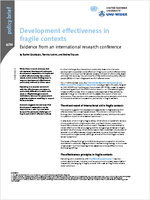
– Evidence from an international research conference
This policy brief draws on the studies presented at the International Research Conference on the Effectiveness of Development Cooperation on 17–18 November 2022, in Brussels, Belgium, jointly organized by UNU-WIDER and the European Commission (DG INTPA) under its capacity as the leading entity of...
Working Paper
pdf
We study the effectiveness of social protection benefits in reducing income and consumption poverty in five sub-Saharan African countries—Ghana, Mozambique, Tanzania, Uganda, and Zambia—in normal times and times of widespread economic crisis. Using tax–benefit microsimulation models with...
Working Paper
pdf
Uganda’s post-colony continues to be haunted by the colonial logic of ethnicity. This logic has mapped the country’s post-colonial political landscape as a terrain on which spirals of ethnic-based conflicts and violence are the norm. Because colonial ethnic spatial demarcations were also unequally...
Working Paper
pdf
– Evidence from household panel data in Uganda
Empirical studies on the effectiveness of aid to the water, sanitation, and hygiene sector (WASH aid) have focused primarily on access to these services as the benchmark for evaluating the effectiveness of aid in this sector. Given the importance of WASH services for public health outcomes, the...
Working Paper
pdf
Agricultural activities in many African countries are bedevilled by a range of risk factors. Using micro-level household datasets from a range of countries in Africa, we examine the drivers of agricultural risks, while exploring the role of context as well as the impact of the COVID-19 pandemic on...

Across sub-Saharan African (SSA) countries there are striking differences in citizen willingness to pay taxes. For example, in Mali, Senegal, and Ghana, around half of those surveyed ‘strongly agreed’ that the government has the right to make people pay taxes, but in Cote d'Ivoire this figure is...

Modern states are complex organizations which perform a broad range of functions. They have an important role in economic and human development. The consensus from recent research suggests that effective states provide crucial public goods and services, such as universal education, public health...
Blog
In this blog, the managing editor of the WIDERAngle shares his personal view on some of the most important —and potentially overlooked— work recently released in the WIDER Working Paper Series. We just passed the halfway point of 2022 and, as of this writing, UNU-WIDER has already released 70...

‘I intend to see a world in which tax policy research is based on evidence, and policy decisions are data-driven.’ This is an aspiration expressed by a participant of the WIDER Winter School 2022. The comment summarizes well the reasoning behind the course and UNU-WIDER’s goals for domestic revenue...
Report
pdf
View the latest UGAMOD country report here. This report documents UGAMOD, the SOUTHMOD model developed for Uganda. It describes the different tax–benefit policies in place, how the microsimulation model picks up these different provisions, and the database on which the model runs. It concludes with...

Just over seven months ago the United Nations convened its 26th Climate Change Conference (COP-26) in Glasgow, with the world nervously emerging from the pandemic. Even before that, energy prices were already ticking up — a trend that accelerated when Russia invaded Ukraine. The global response to...

The first of the Sustainable Development Goals (SDGs) is to end poverty in all its forms, everywhere. The monumental task — a long-time dream of humanity — is followed by 16 more goals under the 2030 Agenda. Though they are all interlinked, to even contemplate their achievement requires a deep well...
Technical Note
pdf
This technical note describes the Uganda Revenue Authority (URA) firm panel, which is constructed from administrative corporate income tax (CIT) returns and firm registration data for the financial years 2013/14–2019/20. The panel dataset contains over 300 variables, which allow the user to study...

– And how to deal with them
Children from poorer families in Kenya, Tanzania, and Uganda face a double disadvantage in their opportunity to access learning: not only is the overall quality of education low in these countries, but they also attend relatively poorer-quality schools. This column reports new evidence on how...

Millions of Africans lost their jobs as a result of the coronavirus pandemic, but state social security systems were of little help to people who lost their income.This is the conclusion of a study conducted by the United Nations University World Institute for Development Economics Research, UNU...
Working Paper
pdf
We use income data from tax registers at the Uganda Revenue Authority from 2011 to 2017 to estimate top income inequality, focusing on the very top—the top 1, 0.1, and 0.01 per cent of the income distribution. The focus on the extreme top is facilitated by access to population data on formal sector...

The COVID-19 pandemic has shown that African tax and social-benefit systems are currently ill-equipped to protect households from sudden income losses. Meaningful progress will require policymakers to reduce the size of the informal sector and improve the design and financing of social-protection...

– How five African countries fared
The number of people living in poverty around the world is estimated to have increased by half a billion people due to the COVID-19 crisis. The African continent has suffered at least US$100 billion in economic costs in 2020, measured by the reduction in trade revenues and financial flows due to the...

Are there enough tax payers to generate the revenue needed by governments to reduce poverty? How adequate are the social security arrangements that already exist? Anyone who has started to probe these issues will know that the answers to such questions can be hard to pin down. This is why the...
Journal Article
This peer-reviewed research is available free of charge. UNU-WIDER believes that research is a global public good and supports Open Access.
– Dead end or stepping-stone?
Despite rapid economic growth in recent decades, informality remains a persistent phenomenon in the labor markets of many low- and middle-income countries. A key issue in this regard concerns the extent to which informality itself is a persistent state. Using panel data from Ghana, South Africa...
Working Paper
pdf
The paper examines the legacy of pre-colonial centralization on tax compliance norms of citizens in contemporary Uganda. By combining geo-referenced anthropological data on pre-colonial ethnic homelands with survey data from several rounds of the Afrobarometer Survey, respondents from the...
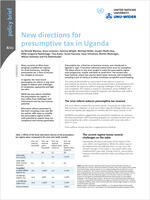
Presumptive tax, a final tax on business income, was introduced in Uganda in 1997. It has been reformed several times since its conception. The latest reform in July 2020 sought to make the presumptive regime more progressive, simpler and fairer to small firms. The revised rates have however raised...
Blog
How do crises such as the COVID-19 pandemic influence inequality and the other way around? This year’s UN Day Dresden put a spotlight on “Inequalities in Crises”. In an interview, we got up close and personal with our keynote speaker Dr Pia Rattenhuber (UNU-WIDER), an expert in development economics...
Working Paper
pdf
– A microsimulation analysis on selected African countries
Although the effect of fiscal drag is well studied in the industrialized world, empirical evidence from developing economies remains limited. Against this backdrop, this study aims to explore the effect of fiscal drag on income distribution and work incentives. To this end, the study employs...
Working Paper
pdf
– Evaluating the 2020 reform and four alternative reform scenarios using UGAMOD, a tax-benefit microsimulation model for Uganda
Presumptive tax, a final tax on business income, was introduced in Uganda in 1997. The latest reform to the regime in July 2020 sought to make the system more progressive, simpler, and fairer to small firms. In this work, we evaluate the reform, focusing on its revenue implications based on...

The situation of Afghanistan has drawn a picture of a poor, conflict-prone, doomed country. But this does not have to be the case. We have examples of several countries able to rise out of poverty, despite conflicts, climate challenges, or large population. International co-operation for eradicating...

Tanzania, similar to most sub-Saharan countries, reported its first COVID-19 cases in March 2020. While GDP estimates suggest that the economy was less hard hit than in other African countries, some sectors have nevertheless experienced negative growth. Even with contained GDP contractions in 2020...
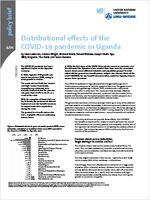
In 2020, the first wave of the COVID-19 pandemic caused an economic crisis that disrupted the Ugandan labour market. How large were the associated income losses across different industries and population groups? To what extent did the general tax-benefit system mitigate the adverse effects of the...

In summer 2020 the SOUTHMOD team set out, with partners, to analyse the impact of government policies on protecting households from getting poorer and avoiding societies from becoming more unequal. Now we are releasing a cross-country comparative study that analyses the distributional effects of the...
Working Paper
pdf
This paper analyses the distributional effects of the COVID-19 pandemic and related tax-benefit measures in 2020 in a cross-country comparative perspective for five African countries: Ghana, Mozambique, Tanzania, Uganda, and Zambia. We first estimate the impact of the crisis on disposable incomes...
Technical Note
pdf
This note sets out two different methods on how to adjust incomes in the microdata underlying the standard SOUTHMOD models to reflect a sudden shock, in this case the COVID-19 shock, as done in the accompanying working paper by Lastunen et al. (2021). The note first describes how industry-specific...

Tanzania is, together with Kenya and Uganda, one of the founding members states of the East African Community (EAC), a regional intergovernmental organization which nowadays consists of six partner states in the region. Since the revival of the new EAC in 2000, EAC Customs Union (EAC-CU) in 2005...

– Research recommendations to improve policies
How can we determine the taxation of wage earners or multinational corporations in a fair manner? Will simplifying tax administration help increase tax compliance in a low-income country context? In this blog, we highlight several policy recommendations arising from our collaborative research...

During the first year of the pandemic, it was wealthier countries, with their comparatively stronger health systems, civil services, legal systems and other public services, that suffered the highest rates of COVID-19. Indeed, countries rated to be best prepared to respond to public health threats...
Background Note
pdf
– The South African experience
Introduction: data for development Globally, one of the key factors associated with increasing use of data to inform policy-making has been the increased availability of new administrative data sources. In 2014, the National Treasury of South Africa (NT) pioneered the development of new tax...

Informality is a pervasive phenomenon in the labour markets of developing countries. Two billion workers, representing 61.2 per cent of the world’s employed population, are in informal employment. Emerging and developing countries account for more than 93 per cent of total global informal employment...

– Does it make a difference?
How could countries in the Global South develop their tax systems further and improve compliance? This analysis shows how two tax administration interventions impacted the number of small business taxpayers and presumptive tax revenues in Uganda. One-stop-shops — where citizens could register for...
Working Paper
pdf
– Do multinational corporations face lower effective tax rates and is there evidence for profit shifting?
We study how large domestic firms and multinational corporations compare in their effective tax rates and whether there is evidence of profit shifting out of Uganda. Using administrative data from the Uganda Revenue Authority and regression analysis, we find that multinational corporations lower...
Technical Note
pdf
– The case of UGAMOD
This note describes how to incorporate sub-national poverty lines into a SOUTHMOD country model using conditional constants within the constants function in such a way that the Statistics Presenter can generate national-level poverty statistics. The Uganda tax-benefit microsimulation model UGAMOD is...

On 17 February 2021 the Groningen Growth and Development Centre (GGDC) and UNU-WIDER Economic Transformation Database (ETD) will be launched. The new database provides crucial information on changes in the economic structure of economies across Africa, Asia, and Latin America. Preliminary findings...
Working Paper
pdf
– Evidence from Ugandan administrative tax data
This paper conducts an impact evaluation of the effects of two tax administration interventions—a taxpayer register expansion and education programme, and a new electronic filing system for presumptive tax—on the number of small business taxpayers and presumptive tax revenues in Uganda. Using a...
Working Paper
pdf
We evaluate a major personal income tax reform in Uganda that came into effect in 2012–13. The reform increased the tax-free lower threshold, increased tax rates for higher incomes, and introduced an additional highest tax band. Using the universe of pay-as-you-earn administrative data submitted by...

– The role of tax and benefit policies in alleviating poverty and inequality
As the crisis caused by the COVID-19 pandemic evolves, developing nations are struggling to deliver economic assistance and public services to their citizens, under pressures of fiscal constraints and tax revenue losses. To help governments in the developing world navigate through the crisis, it is...
Working Paper
pdf
– Revenue generation, investor-stakeholder alignment, and public policy
This paper discusses the political economy of oil in Uganda since the announcement of its discovery in 2006. It focuses on the dynamics of oil revenue generation (pre-commercial production) and expenditure, investor-stakeholder contestation (i.e. between bureaucrats, investors/oil companies, and...

– How can natural resources support inclusive growth in Africa
For a growing number of countries in Africa the discovery of natural resources is a great opportunity, but one accompanied by considerable risks. There is an extensive literature linking natural resource dependence to poor economic performance. One cause is that resource-abundant economies tend to...

– Why does more than numbers matter
Can tax research be inspiring? Looking back at the three years of collaboration between UNU-WIDER and the Uganda Revenue Authority (URA), the answer is yes – but even that is just the start. Our joint research and capacity-building programme carrying out analysis of tax administrative data has...
Background Note
pdf
– Insights from the sub-Saharan African experience
Introduction The COVID-19 pandemic poses important risks for people’s health and economic wellbeing. While the full socio-economic consequences remain uncertain, the pandemic’s impact on the labour market has become an issue of global concern. Especially low-income earners with jobs in precarious...
Working Paper
pdf
The distributional analysis of consumption taxes is useful for establishing the welfare impact of tax policy. This paper uses the UGAMOD microsimulation model to establish the tax incidence and welfare impact of excise duty in Uganda. The results reveal that households in the top deciles pay more in...

View the latest UGAMOD country report here. This report documents UGAMOD, the SOUTHMOD model developed for Uganda. The report describes the different tax–benefit policies in place, how the microsimulation model picks up these different provisions, and the database on which the model runs. It...
Background Note
pdf
– The case of Kenya
The COVID-19 pandemic has now spread to over 180 countries, including several countries in sub-Saharan Africa.1 Kenya reported its first COVID-19 case on 13 March 2020. By 31 March the number of confirmed cases had risen to 59, with over 70 per cent of infections in Nairobi. As at 22 April 2020, the...
Working Paper
pdf
– Are impact evaluation and impact evaluation synthesis contributing to evidence generation and use in low- and middle-income countries?
In 2006 the Center for Global Development’s report ‘When Will We Ever Learn? Improving lives through impact evaluation’ bemoaned the lack of rigorous impact evaluations. The authors of the present paper researched international organizations and countries including Mexico, Colombia, South Africa...

– Natural Resources and Industry in Africa
For a growing number of countries in Africa the discovery and exploitation of natural resources is a great opportunity, but one accompanied by considerable risks. Countries dependent on oil, gas, and mining have tended to have weaker long-run growth, higher rates of poverty, and greater income...

– Actors, institutions and dynamics
Since the mid-1990s, there has been in Africa something of a ‘quiet revolution’ in poverty reduction strategies with the proliferation of social assistance programmes that entail cash transfers to the poor. The past two decades have also been characterized by a series of important political...
Working Paper
pdf
– Dead end or steppingstone?
Despite rapid economic growth in recent decades, informality remains a persistent phenomenon in the labour markets of many low- and middle-income countries. A key issue in this regard concerns the extent to which informality itself is a persistent state. Using panel data from Ghana, South Africa...

View the latest UGAMOD country report here. This report documents UGAMOD, the SOUTHMOD model developed for Uganda. This work was carried out by Uganda Revenue Authority (URA) and Makerere University in collaboration with the project partners. The results presented in this report are derived using...
Journal Article
This peer-reviewed research is available free of charge. UNU-WIDER believes that research is a global public good and supports Open Access.
Can agricultural development programs improve health-related outcomes? We exploit a spatial discontinuity in the coverage of a large-scale agricultural extensionprogram in Uganda to causally identify its effects on malaria. We find that eligibility for the program reduced the proportion of household...

At the end of last year, I filmed a lecture that will be part of a massive open online course (MOOC) on industrialization in Africa. The course is based on a joint research project between the Brookings Institution and UNU-WIDER called Jobs, poverty and structural change in Africa. The topic of the...

– UNU-WIDER provides open access to a wealth of information
The question ‘why is there so little industrialization in Africa?’ has been a key focus of UNU-WIDER researchers and research partners for the last decade. Many Asian economies started their industrialization processes from conditions similar to those that African countries are experiencing today...
Working Paper
pdf
As it transitions to an oil-producing country, Uganda’s investments in infrastructure and physical capital will increasingly depend on the ability of the construction sector to respond to surges in demand and transform investment effort into outcomes. Using administrative and survey data, this paper...
Working Paper
pdf
– How much, when, and how will it be governed?
We study Uganda’s journey to become a petroleum producer and provide estimates regarding the size and timing of the oil revenues to be expected. At an average US$38 per capita per year over a 33-year period, oil revenue by itself will not be transformational for the Ugandan economy, but it could...

The tax-benefit microsimulation model developed for Mozambique, MOZMOD, has proved to be valuable in analysing the impacts and budget implications of a new policy proposal in Mozambique. The importance of the tool has also been recognized in the government. Tax-benefit microsimulation helps to...
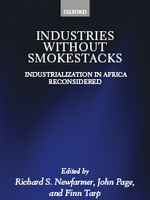
From the book:
Industries without Smokestacks
Working Paper
pdf
This paper analyses policy options to promote local content in Uganda as it transitions into an oil-producing country. It contends that productive linkages between oil and gas exporters and domestic suppliers in a range of ‘connected’ goods and services sectors can be a source of broad-based...
Working Paper
pdf
– The Bayesian perspective
Understanding how internal labour migration affects the agricultural sector is important for all developing countries whose markets do not work well or are non-existent. In fact, even if the movement out of the agricultural sector can be viewed as a process to reach development for many African...

The importance of reducing poverty is universally acknowledged, and represents an important part of the Sustainable Development Goals. However, the appropriate measurement of poverty and wellbeing remains complex and controversial. A UNU-WIDER study addresses means to significantly lower the...

– The latest evidence on the effectiveness of ODA
The death of aid has often been declared, and private capital flows as well as earnings from natural resources now far exceed official development assistance (ODA) in aggregate. However, the recent and sharp downturn in resource earnings, the ability of ODA to fund public goods that private capital...
Blog
Several large-scale efforts have been made to combat malaria in the last decade under the Millennium Development Goals, and while these have led to a rapid decline in cases, malaria continues to exact a heavy toll on sub-Saharan Africa, both in terms of human life and economic cost. Given the...

Over the past decade significant hydrocarbon discoveries have been made across East Africa. Unsurprisingly, the respective governments countries have been excited about these discoveries, expecting revenue and local economic opportunities to follow suit. However, concerns about the macroeconomic...
Working Paper
pdf
– Female entrepreneurs who succeed in male-dominated sectors
Occupational segregation significantly contributes to the earnings gender gap worldwide. We look at differences in outcomes for male and female enterprises and their sectors in Sub-Saharan Africa, a region of high female participation in entrepreneurship. Data on Uganda show that women breaking into...
Journal Article
This peer-reviewed research is available free of charge. UNU-WIDER believes that research is a global public good and supports Open Access.
Part of Journal Special Issue
Macroeconomic Perspectives on Aid
Working Paper
pdf
– Evidence from an artefactual field experiment in rural Uganda
We study gender differences in bilateral bargaining using an artefactual field experiment in rural Uganda, through variation in gender composition of bargaining pairs and in disclosure of identities. Disagreement is common independently of disclosure condition, but less frequent among female-only...
Journal Article
This peer-reviewed research is available free of charge. UNU-WIDER believes that research is a global public good and supports Open Access.
Part of Journal Special Issue
Measuring quality of care
Working Paper
pdf
Objective: To analyse factors affecting variations in the observed quality of antenatal and sick-child care in primary-care facilities in seven African countries. Methods: We pooled nationally representative data from service provision assessment surveys of health facilities in Kenya, Malawi...
Working Paper
pdf
– Impacts on investments in education in post-war Uganda
This paper looks at the spillover effects of grants under the Youth Opportunities Programme (YOP) on human capital investments in conflict-affected Northern Uganda. The YOP grant was primarily aimed at providing start-up money to groups of underemployed young people, and in practice worked similarly...
Working Paper
pdf
We use unique high-frequency Government of Uganda and Government of Rwanda tax administration datasets to map the characteristics of ‘industries without smokestacks’ in East Africa. First, we find firm size appears to be crucial for successful industries without smokestacks in services and agro...
Working Paper
pdf
– The case of East Africa
In East Africa, there have been numerous concerns over logistics efficiency. Among them, the regional integration of the trucking industry is perceived as a major problem. This paper utilizes a combination of unpublished data surveys and published data (mainly port data) to assess the extent of...
Working Paper
pdf
As the technology of climate-dependent energy sources is improving—both cheaper and more efficient—the energy sources are becoming more accessible for many of the nations in Africa. However, little is known about the underlying climate that would therefore be harvested by renewable technologies...
Working Paper
pdf
– An analysis of attitudes towards redistribution across groups in Africa
Inequalities between ethnic or racial groups, defined as horizontal inequalities, are pervasive and persistent. They persist due to cumulative and reinforcing inequalities arising from unequal access to different types of capital. Affirmative action policies can provide promising opportunities for...
Working Paper
pdf
In 2015 the Government of Uganda agreed to start rolling out a social pension programme, and increasing its own contribution to it. This was driven by the highly politicized efforts of a transnational policy coalition, led by international donors and national bureaucrats. It was a struggle over...

The literature on Africa’s development abounds in big theories — structural transformation, pro-poor growth, inclusive growth, among others. ‘Growth miracles’ (with or without a question mark) are sought and often proclaimed. The World Bank has even pondered whether Africa can overcome its ongoing...

There has been great excitement in recent years about the huge oil and gas finds, offshore and onshore, in a number of lower- and lower-middle-income countries such as Mozambique, Tanzania, Uganda and, more recently, Kenya. The scale of the potential reserves, future production levels and government...

Women in most parts of the developing world are under-represented in the workplace and poorly paid. One reason for this is the gender gap in education – women tend to be less schooled than men. Two countries that have made progress in getting girls into schools are Bangladesh and Uganda. However...
Blog
From 2000-2014, like many other sub-Saharan African countries, Kenya experienced high growth, at an average of 4.37 percent. Unfortunately, the 2007-2008 election-related violence as well as the global financial crisis halted much of Kenya’s economic progress, meaning it has lagged slightly behind...
Blog
The recovery and acceleration of economic growth in sub-Saharan Africa since about 1995 has been widely recognised. But less is known about the extent to which this growth has led to improvements in welfare and poverty reduction in particular. In our recently published, open-access book, we attempt...
Blog
– A reality check
Several countries in Africa – including Ghana, Kenya, Mozambique, Tanzania, and Uganda - have recently discovered large oil and gas or other mineral resources. Other African countries such as Angola, Botswana, and Nigeria have been exploiting very large extractive wealth for many years. Natural...
Blog
To Stockholm, for Sida’s Development Talks on the theme ‘Africa rising? Poverty and growth in sub-Saharan Africa’. Finn Tarp and Andy McKay spoke about their new UNU-WIDER book, co-edited with Channing Arndt, entitled Growth and Poverty Reduction in Sub-Saharan Africa—the book is on full open access...

– Evidence from a 16 country study
While the recovery and acceleration of economic growth in sub-Saharan Africa (SSA) since about 1995 has been widely recognized, much less is known about the extent to which this growth has been translated into improvements in welfare for the population in general and poverty reduction in particular...
Book Chapter
This peer-reviewed research is available free of charge. UNU-WIDER believes that research is a global public good and supports Open Access.
– Explorations using a New Set of Poverty Lines
From the book:
Growth and Poverty in Sub-Saharan Africa
Blog
The sculpture below in Mexico City is called ‘El Ángel de la Securidad Social’ (The Angel of Social Security) and was created by Jorge Marín in 2013 to commemorate the 70th anniversary of the founding of the Instituto Mexicano del Seguro Social (IMSS) in 1943. In addition to a system of social...
Journal Article
This peer-reviewed research is available free of charge. UNU-WIDER believes that research is a global public good and supports Open Access.
Part of Journal Special Issue
Aid, Education Policy, and Development
Working Paper
pdf
Uganda has seen impressive economic growth and substantial poverty reductions over the past few decades. Today, official headcount poverty stands at about 20 per cent. However, recent research relying on non-monetary wealth indicators challenges official poverty statistics and suggests that...
Working Paper
pdf
– Evidence from an agricultural intervention in Uganda
We exploit a spatial discontinuity in the coverage of an agricultural extension program in Uganda to causally identify its effects on malaria. We find that eligibility for the program reduced the incidence of malaria by 8.8 percentage points, with children and pregnant women experiencing most of...
Blog
I recently returned from a week at the University of Western Cape (UWC) in South Africa, speaking at a conference honouring Nobel laureate Desmond Tutu who had been Chancellor of the university for 25 years—and had helped to encourage and defend students and staff during the hardest years of...
Blog
And so we come to the summer Angle. We have just passed the longest day (midsummer) in Helsinki, with 19 or so hours of daylight. The seagulls nesting near the UNU-WIDER office have hatched their chicks, and everyone is looking forward to the summer holiday month of July. Here at UNU-WIDER we are in...
Research Brief
pdf
– Income inequality in former British African colonies
The presence of European colonial powers in Africa has left a long-lasting legacy that has severely impacted their development trajectories. But what are the lingering effects of colonization on economic performance, in particular with regard to inequality? While clear information on many economic...
Working Paper
pdf
The paper proposes an analysis of the recent distributional dynamics in Uganda. This analysis is performed by endorsing an opportunity egalitarian perspective, in order to evaluate the outcome dynamics of specific groups of the population and infer the role of growth in the evolution of inequality...
Working Paper
pdf
The paper investigates the differences in private marginal returns to education between wage-employees and the self-employed in Uganda, using the Mincerian framework with pooled regression models. We use a two-wave household panel to estimate homogenous and heterogeneous private returns to education...

– Bad Luck or Bad Policy?
16 December 2014 John Page On 20 November 2014 the United Nations celebrated the 25th Africa Industrialization Day. But perhaps ‘celebrate’ is not exactly the right word. Africa’s experience with industrialization over the past quarter century has actually been disappointing. In 2010, sub-Saharan...
Research Brief
Economic growth has had a negative effect on unemployment and poverty reduction in Africa. The transition from low- to middle income requires within sector increases in productivity and a shift of labour resources from low productivity agriculture to high productivity manufacturing. Structural...

– Economywide Analysis for Ethiopia and Uganda
Rapid urbanization is an important characteristic of African development and yet the structural transformation debate focuses on agriculture’s relative merits without also considering the benefits from urban agglomeration. As a result, African governments are often provided conflicting...
Working Paper
pdf
– Implications for Poverty and its Dynamics in Uganda
Official poverty figures in Uganda are flawed by the fact that the underlying poverty lines are based on a single national food basket that was constructed in the early 1990s. In this paper, we estimate a new set of poverty lines that accounts for the widely divergent diets throughout the country...
Working Paper
pdf
– Africa’s Presidential Investors’ Advisory Councils
Recent writing on industrial policy stresses the need for coordination between the public and private sectors. This paper examines the performance of one such coordination mechanism, Presidential Investors’ Advisory Councils, in Ethiopia, Senegal, Tanzania, and Uganda. It finds that the councils...
Working Paper
pdf
The study examines the relationship between climatic factors and reported malaria cases using data from 12 districts in Uganda over the period 2000-2011. A panel dataset comprising temperature, temperature standard deviation; minimum humidity; maximum humidity; precipitation; precipitation standard...
Working Paper
pdf
– Are there Gender Differences Across Households?
This paper hypothesizes that adaptation to climate change is influenced by the gender of the decision maker of the household. Using a two-wave household panel survey dataset, choice of adaptation strategies employed by female- and male-headed households are examined. A multinomial logit model is...
Research Brief
In addition to large class sizes, peer effects, such as overage-for-grade and late-starting pupils, are challenges for the successful development of education sectors in East Africa; there is a comparative lack of research on the impact of peer effects. Household surveys provide good data with which...
Journal Article
This peer-reviewed research is available free of charge. UNU-WIDER believes that research is a global public good and supports Open Access.
Part of Journal Special Issue
Urban Governance and Service Delivery in sub-Saharan Africa
Journal Article
This peer-reviewed research is available free of charge. UNU-WIDER believes that research is a global public good and supports Open Access.
– The Role of Politics and Policies
Part of Journal Special Issue
Urban Governance and Service Delivery in sub-Saharan Africa

This special issue comprises UNU-WIDER research focusing on key governance challenges related to addressing gaps in urban service delivery in sub-Saharan Africa. First, due to decentralisation policies in much of Africa, the provision of services is often transferred to sub-national authorities. But...
Working Paper
pdf
China’s importance as a major donor outside the traditional Western donors has been increasing and this has helped to bridge the funding gaps in developing countries. At the same time, South-South financial assistance still comes with less conditionality making China’s aid model different to Western...
Blog
26 March 2014 Roger Williamson Africa is growing, with The Economist noting that 6 out of 10 of the world’s fastest growing economies for 2000-10 were in Africa. But how optimistic should we be? UNU-WIDER’s new research priorities for 2014-18 are transformation, inclusion, and sustainability. All...
Research Brief
pdf
Favouritism of government controlled councils is most distinct through interference in local politics rather than through funding mechanisms. The motivation of central government intervention in land deals is two-fold - their actions can be explicitly motivated by politics and self-interest or they...
Blog
28 January 2014 Tony Addison The first Angle of 2014 comes amidst the start up of our new research programme which is now kicked off. It has three big themes: transformation, inclusion and sustainability. We’ll be putting up further details of projects and conferences on the website as things evolve...
Working Paper
pdf
– Field Evidence from South Africa and Uganda
A new methodology, Tracking Under-Reported Financial Flows (TUFF), allows us to systematically gather open-source information—e.g. news reports, case studies, project inventories from embassy websites, and grant and loan data published by recipient governments—about Chinese development finance...
Working Paper
pdf
The paper looks at the evolution of industry in Uganda examining drivers and constraints since the pre-colonial period in the 1940s to date. It is argued that the state played a central role in industrialization during the pre-colonial and immediate post-colonial period. The paper further looks at...
Blog
The research programme ReCom – Research and communication on foreign aid – is ending this year. There is a large and unique collection of research synthesising the impact of development cooperation – more than 220 working papers which are the result of collaboration between more than 270 researchers...
Blog
– What are the Implications for Development and Democracy?
11 December 2013 Danielle Resnick Economic transformation and social mobility are currently popular themes in the development community. Both themes are especially relevant to analyses of the small but growing middle class in sub-Saharan Africa. Due to impressive rates of economic growth over the...
Research Brief
pdf
Foreign aid is a significant element of Uganda’s long-run fiscal system. Aid is associated with increased tax collection effort and public spending in Uganda. Development assistance is also associated with reduced domestic borrowing in Uganda. Aid is not sufficient to balance Uganda’s budget. Budget...
Working Paper
pdf
This paper begins by noting that Uganda has been a public sector reform leader in Africa. It has pursued reforms actively and consistently for three decades now, and has produced many laws, processes and structures that are ‘best in class’ in Africa (and beyond). The problem is that many of the...
Working Paper
pdf
A dynamic relationship between foreign aid and domestic fiscal variables in Uganda is analysed using a cointegrated vector autoregressive model over the period 1972-2008. Results show that aid is a significant element of long-run fiscal equilibrium, is associated with increased tax effort and public...
Blog
24 September 2013 Tony Addison As Helsinki moves into a crisp sunny autumn, Angle brings you news of two big UNU-WIDER events. ‘Egalitarian Principles: The Foundation for Sustainable Peace’ was the topic of the 17th WIDER annual lecture, given by former President of Finland and Nobel Peace Prize...
Working Paper
pdf
– a Cointegrated Vector Autoregressive Approach
This paper employs a cointegrated vector autoregressive model to assess the growth effect of aid in Uganda over the period 1972-2008. Results show that aid in Uganda has had both direct and indirect beneficial association with growth; that it is the productivity and not the stead state level of...
Blog
22 August 2013 Roger Williamson Given the high growth rates since 2000 and low labour costs, Africa could develop manufacturing industry, agro-processing, and services. But these cost advantages can easily be undermined by factors such as inadequate infrastructure, particularly power, transportation...
Blog
– An Interview with Wisdom Akpalu
29 August 2013 Carl-Gustav Lindén Since 1997 the University of Gothenburg, Sweden has been running a unique PhD programme on environmental and development economics with a large participation of graduate students from developing countries. This long-term capacity-building programme has been financed...
Working Paper
pdf
There has long been an emphasis on the importance of decentralization in providing better quality public services in the developing world. In order to assess the effectiveness of decentralization I examine here the case study of Uganda, which has seen major decentralization of power over the last...
Blog
29 June 2013 Tony Addison The June-July summer issue of Angle comes to you amid the 19 hours daylight of the Finnish mid-summer. Last week UNU-WIDER’s Learning to Compete (L2C) conference on industrial policy and development in Africa was held here in Helsinki. We welcomed 200 researchers and policy...
Blog
– Is an Agriculture-led Developmental Model the Way Forward for sub-Saharan Africa?
9 May 2013 Lorraine Telfer-Taivainen and Roger Williamson Pathways to Industrialization in the Twenty-First Century, (edited by Adam Szirmai, Wim Naudé, and Ludovico Alcorta) a new book with important messages on industrial policy, particularly for successfully developing economies, was launched in...
Working Paper
pdf
– a Hybrid Evaluation Approach Applied to Uganda
Prioritizing public investments requires information on relative returns that are difficult to derive from disparate evaluation studies. This paper presents a ‘hybrid’ approach that combines ex post evaluation data with an economy-wide model for experimenting ex ante with alternative investment...
Blog
With Africa’s increasing urbanization, governments and local authorities - supported by donors - are under pressure to provide better urban services such as water and sanitation. The scale of the transformation tells a story of grand political and social change - in the way people are going to live...
Research Brief
It has long been recognized that the creation of an adequate infrastructure is vital for creating sustainable growth and reducing poverty in Africa. However the gap between the investment that is needed and the money currently available is too big to be filled by aid alone. In the WIDER Working...
Blog
– Future Agenda
This is the second of a two-part article presenting key discussion points from the UNU-WIDER gender equality workshop held 12-13 July 2012, in Helsinki. The first part of this article discussed the priorities and internal challenges for donor agencies with respect to promoting gender equality and...
Working Paper
pdf
Uganda, like other African countries, has implemented reforms to decentralize political authority to local governments and reintroduce multiparty elections. This combination creates opportunities for national partisan struggles to emerge in local arenas and influence local service delivery. This...
Working Paper
pdf
Rapid urbanization is an important characteristic of African development and yet the structural transformation debate focuses on agriculture’s relative merits without also considering the benefits from urban agglomeration. As a result, African governments are often provided conflicting...
Research Brief
– What Does the Evidence Say?
Donors are concerned about how their aid is used, especially how it affects public spending. For low-income countries that receive significant amounts of aid relative to GDP, most of the aid spent in the country is given to the government either directly, or by financing services that would...
Journal Article
– An Analysis of Agricultureversus Urban-led Development in Uganda
Traditional development models focus on the sector rather than location of growth. Advocates of agriculture-led strategies emphasise agriculture's strong growth linkages and potential to raise rural incomes. The new economic geography literature, however, provides theoretical support for urban...
Blog
Tony Addison, Tseday Mekasha, Milla Nyyssölä, Lucy Scott, Finn Tarp, Tuuli Ylinen To meet development objectives, aid recipients and their donor partners need to effectively manage the macroeconomic effects of aid. Aid can improve the economy's supply-side and raise growth. But if the macroeconomic...
Blog
Tony Addison The present currency turmoil is both a symptom and a cause of profound changes now underway in the global economy. In part 1 of this two-part article, we focus on Latin America and Europe. Part 2 discusses China, and will appear in the November Angle. There is a famous British poster...
Blog
Danielle Resnick In just a little over a month, policy makers will converge in Busan, South Korea for the fourth High Level Forum on Aid Effectiveness. Among other issues, policy makers will consider financial pressures in donor countries and the rise of new actors in development, including private...
Blog
– A New Vanguard for Democracy?
Danielle Resnick The victory of the opposition party, the Patriotic Front (PF), in Zambia’s presidential elections this month heralds a new era in that country’s democracy. The leader of the PF, Michael Sata, defeated the sitting president, Rupiah Banda, whose Movement for Multiparty Democracy (MMD)...
Book Chapter
From the book:
Entrepreneurship and Economic Development
Blog
– Examples from Ethiopia and Chile
Mulu Gebreeyesus and Michiko Iizuka Industrial policy can be defined as the policies that stimulate specific economic activities and promote structural changes. It is not about industry per se but also includes non-traditional agriculture or service (Rodrik 2007). Pack and Saggi (2006) similarly...
Journal Article
Part of Journal Special Issue
African Development in an Urban World
Working Paper
pdf
Urbanization is one of the critical global trends shaping the future of humanity. At the same time, it has been argued that full development requires an urbanized environment. This paper attempts to examine and characterize the major phases of urbanization in Uganda and what this means for urban...
Blog
Wim Naudé External shocks can have devastating consequences for development, as the recent earthquake in Haiti, the Asian Tsunami of 2004 and other natural disasters in recent times have made clear. But man-made disasters also occur with regular frequency, the most recent financial crisis which...
Book Chapter
From the book:
Foreign Aid for Development
Journal Article
This peer-reviewed research is available free of charge. UNU-WIDER believes that research is a global public good and supports Open Access.
– Policy Lessons from Recent Experience
Part of Journal Special Issue
Development Aid
Blog
Luc Christiaensen Senior Research Fellow at UNU-WIDER At the G8 July summit in Aquila, Italy, US$ 20 billion was pledged to support farmers in poorer countries. Is the world getting serious about food security? To be sure, while growing water shortages and climate change pose important challenges...
Working Paper
pdf
– The Case of Uganda
This paper discusses the characteristics and determinants of entrepreneurial behaviour in Uganda. It is based on a recent survey of urban and rural entrepreneurs, executed in May 2008. The main dependent variables are business success, gestation activities and innovative performance. The paper...
Working Paper
pdf
The paucity of non-agricultural paid employment, and under utilization of female labour in Uganda, and other sub-Saharan African countries, is often seen to be the next major obstacle to further poverty reduction and development in the region. Despite this there have been few empirical...
Working Paper
pdf
– Policy Lessons from Recent Experience
This paper investigates the macroeconomic challenges created by a surge in aid inflows. It develops an analytical framework for examining possible policy responses to increased aid, in terms of absorption and spending of aid—where the central bank controls absorption through monetary policy and the...
Working Paper
pdf
– Implications of Results of the Joint Evaluation of General Budget Support
The paper discusses implications for practice and theory of the recently completed Joint Evaluation of General Budget Support 2004-06 based on case studies in Burkina Faso, Malawi, Mozambique, Nicaragua, Rwanda, Uganda and Vietnam. The paper first looks at the extent to which general budget support...
Displaying 192 of 227 results
 Join the network
Join the network




